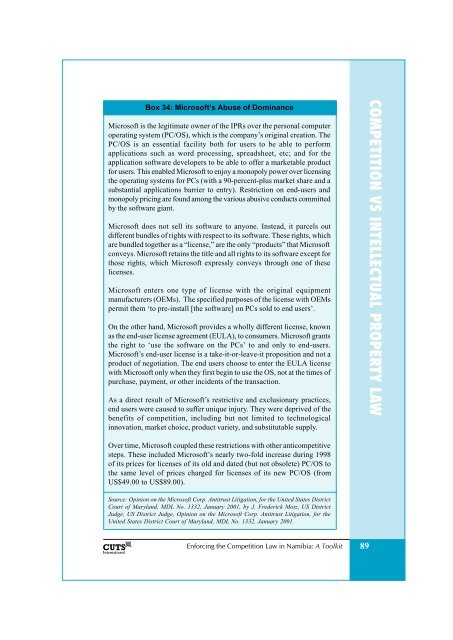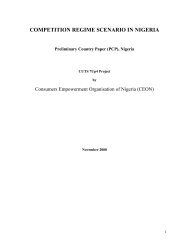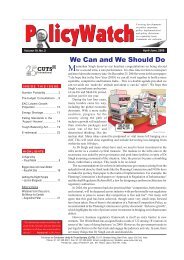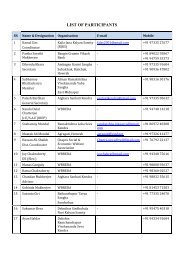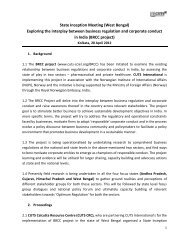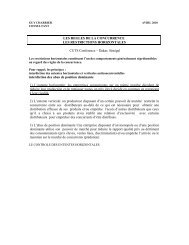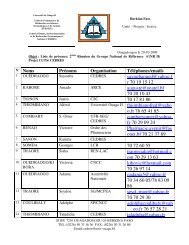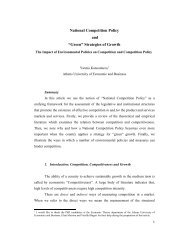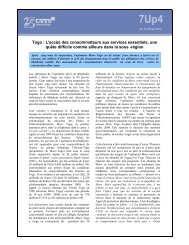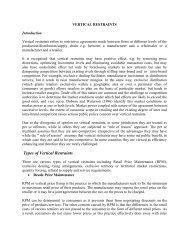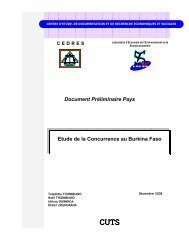Enforcing the Competition Law in Namibia A Toolkit - cuts ccier
Enforcing the Competition Law in Namibia A Toolkit - cuts ccier
Enforcing the Competition Law in Namibia A Toolkit - cuts ccier
You also want an ePaper? Increase the reach of your titles
YUMPU automatically turns print PDFs into web optimized ePapers that Google loves.
Box 34: Microsoft’s Abuse of Dom<strong>in</strong>anceMicrosoft is <strong>the</strong> legitimate owner of <strong>the</strong> IPRs over <strong>the</strong> personal computeroperat<strong>in</strong>g system (PC/OS), which is <strong>the</strong> company’s orig<strong>in</strong>al creation. ThePC/OS is an essential facility both for users to be able to performapplications such as word process<strong>in</strong>g, spreadsheet, etc; and for <strong>the</strong>application software developers to be able to offer a marketable productfor users. This enabled Microsoft to enjoy a monopoly power over licens<strong>in</strong>g<strong>the</strong> operat<strong>in</strong>g systems for PCs (with a 90-percent-plus market share and asubstantial applications barrier to entry). Restriction on end-users andmonopoly pric<strong>in</strong>g are found among <strong>the</strong> various abusive conducts committedby <strong>the</strong> software giant.Microsoft does not sell its software to anyone. Instead, it parcels outdifferent bundles of rights with respect to its software. These rights, whichare bundled toge<strong>the</strong>r as a “license,” are <strong>the</strong> only “products” that Microsoftconveys. Microsoft reta<strong>in</strong>s <strong>the</strong> title and all rights to its software except forthose rights, which Microsoft expressly conveys through one of <strong>the</strong>selicenses.Microsoft enters one type of license with <strong>the</strong> orig<strong>in</strong>al equipmentmanufacturers (OEMs). The specified purposes of <strong>the</strong> license with OEMspermit <strong>the</strong>m ‘to pre-<strong>in</strong>stall [<strong>the</strong> software] on PCs sold to end users’.On <strong>the</strong> o<strong>the</strong>r hand, Microsoft provides a wholly different license, knownas <strong>the</strong> end-user license agreement (EULA), to consumers. Microsoft grants<strong>the</strong> right to ‘use <strong>the</strong> software on <strong>the</strong> PCs’ to and only to end-users.Microsoft’s end-user license is a take-it-or-leave-it proposition and not aproduct of negotiation. The end users choose to enter <strong>the</strong> EULA licensewith Microsoft only when <strong>the</strong>y first beg<strong>in</strong> to use <strong>the</strong> OS, not at <strong>the</strong> times ofpurchase, payment, or o<strong>the</strong>r <strong>in</strong>cidents of <strong>the</strong> transaction.As a direct result of Microsoft’s restrictive and exclusionary practices,end users were caused to suffer unique <strong>in</strong>jury. They were deprived of <strong>the</strong>benefits of competition, <strong>in</strong>clud<strong>in</strong>g but not limited to technological<strong>in</strong>novation, market choice, product variety, and substitutable supply.COMPETITION VS INTELLECTUAL PROPERTY LAWOver time, Microsoft coupled <strong>the</strong>se restrictions with o<strong>the</strong>r anticompetitivesteps. These <strong>in</strong>cluded Microsoft’s nearly two-fold <strong>in</strong>crease dur<strong>in</strong>g 1998of its prices for licenses of its old and dated (but not obsolete) PC/OS to<strong>the</strong> same level of prices charged for licenses of its new PC/OS (fromUS$49.00 to US$89.00).Source: Op<strong>in</strong>ion on <strong>the</strong> Microsoft Corp. Antitrust Litigation, for <strong>the</strong> United States DistrictCourt of Maryland, MDL No. 1332, January 2001, by J. Frederick Motz, US DistrictJudge, US District Judge, Op<strong>in</strong>ion on <strong>the</strong> Microsoft Corp. Antitrust Litigation, for <strong>the</strong>United States District Court of Maryland, MDL No. 1332, January 2001.<strong>Enforc<strong>in</strong>g</strong> <strong>the</strong> <strong>Competition</strong> <strong>Law</strong> <strong>in</strong> <strong>Namibia</strong>: A <strong>Toolkit</strong> 89


